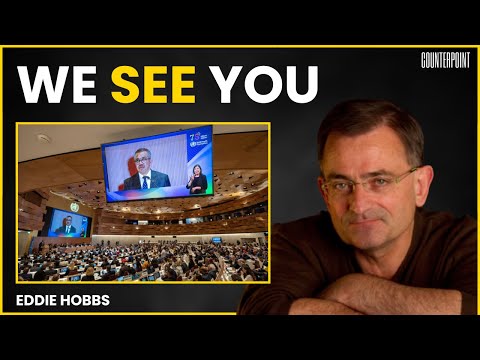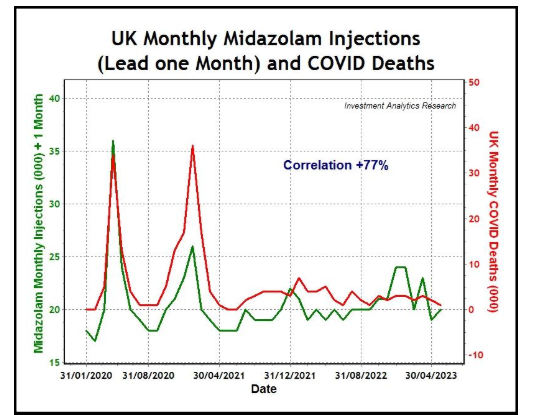As the UK (E+W) campaign group UsForThem point out, the WHO wants to brick in the response to Covid-19 as a blueprint for the future - as the WHO and its paymasters like lockdowns, compulsion, vaccine mandates and passports and all the rest, the only problems it sees being
(i) that not only the people but their governments can reist them, and
(ii) it would be nice if they could be applied to any scenario which can be argued is a Public Health Emergency of International Concern; climate change for example; even a mental health crisis could fit the bill, as the sole arbiter will be the WHO president.
In a nutshell, the ‘optional’ nature is what it wants to change.
Some recent developments (though there is much happening behind the scenes):
Countries opted out
[Holland](16/4/24 HOT! Today Dutch Parliament Votes to Instruct the Government to Demand a Delay in both WHO votes–and if no delay, to vote against the proposals HOT! Today Dutch Parliament Votes to Instruct the Government to Demand a Delay in both WHO votes--and if no delay, to vote against the proposals), Japan. Check out Africa news item.
Other rumblings : Austria trying to resist, Global Health Responsibility Agency (GHRA) formed.
US opposition at state level.
US states : Louisiana, Oklahoma passed legislation to block external control. Florida.
Other rumblings. Florida seemed to pass a law pre-empting federal takeover. Democrats’ Maine’s joint order was resisted.
More recently in the US, Dr Meryl Nass (who if not the de facto global opposition leader to the WHO takeover plan, is doubling up nicely as the main publicity coordinator) announced that 22 states had rebelled:
We did it!!! 22 Attorneys-General in the US have told Joe Biden that the WHO will not be making public policy in their states!
For the thousands of people who have been making calls and writing letters–you are the best! Global governance will not be starting in the US!
May 08, 2024
This is HUGE!!! Give yourself a shout-out if you helped make this happen!!
But there is just one more ask. We need to stop this in the other 28 states. We need to pass the 2 bills that would require the treaty and international health regulation amendments to be ratified by the US Senate, where they will die… Because 49 US Senators have already made clear they will vote NO!
On the global front Dr Nass was very restrained despite apparent backtracking on many of the most serious concerns.
As detailed by UsForThem:
BRIEFING PAPER FOR PARLIAMENTARIANS AND THE PUBLIC
The IHR Amendments Package and WHO Pandemic Agreement
…This briefing paper explains the key changes and persisting issues. In summary:
★ Many of the most egregious proposals in the original IHR amendments package
have been dropped or significantly scaled back, including:
○ Proposals which would have ordained the WHO with powers to issue binding directives to Member States (dropped)
○ Proposals which would have erased reference to “dignity, human rights and fundamental freedoms” (dropped)
○ Proposals which would have allowed the WHO to intervene on the basis of having identified a mere “potential” health emergency (dropped)
○ Provisions which had proposed to expand the scope of the IHR’s to include “all risks with a potential to impact public health” (dropped)
○ Provisions expressly favouring the use of digital health passports (dropped)
○ Proposals which aimed to construct a global censorship and ‘information control’ operation led by the WHO (dropped, though the texts still commit States to enhance their abilities to counter ‘misinformation and
disinformation’)
○ Plans for the WHO to police compliance with all aspects of the IHRs
(scaled back).
The reason for Nass’s caution is suspicion that some or all of these apparent retreats may have been tactical. Due to opaqueness, ongoing draft changes and updates (see below), the visible reality is that come the day of the deadline, many government reps won’t know the current position on the items of concern and won’t know exactly what they are voting for.
9/5/24 The WHO Falsely Claims to Have Published Final Pandemic Treaty Draft in Required Time Before Key Vote
Dr David Bell and Dr Thi Thuy Van Dinh
The World Health Organisation (WHO) recently put up a defence of its violation of its own legal requirements by submitting draft amendments to the International Health Regulations (IHR) for a vote at the 77th World Health Assembly (WHA) this May. This was in response to various concerns raised in parliaments and civil society. It matters, because in ignoring legal requirements and rushing a vote the WHO is putting global health and economies at risk, as well as acting like a spoilt child, which suggests the organisation is no longer fit for its mandate.
A rush without reason
…
There is, of course, a reason for the rush, and that’s just it - to rush the delegates and their parliaments out of their capacity to assess and report what is happening.
In order to achieve this confusion the WHO is breaking fundamental rules and lying about it.
The deliberate dishonesty in the tactics of the WHO (or more accurately, their corporate backers) could not be more obvious.
As UsForThem explains:
"Perhaps in response to the various concerns raised, the IHR Secretariat recently updated its Q&A online section with a quite imaginative claim that the WHO has fulfilled the requirements of article 55(2), as below:
In fulfilling the Article 55(2) requirement, the WHO Secretariat circulated all proposals for amendments to the IHR on November 16th 2022, some 17 months before the 77th World Health Assembly, which begins on May 27th 2024, when they are proposed for consideration.
In addition, the IHR Secretariat even claimed that it had exceeded the technical requirements under Art. 55(2) IHR by communicating “all proposed changes to these [308] amendments developed by the WGIHR drafting group, to all 196 States Parties, after each WGIHR meeting”.
However, a factual account of the relevant WHO documents easily demonstrates that these claims are flawed. The amendments presented over 17 months ago, by and large, no longer exist. The amendments reached after each round of negotiations have also been largely modified, replaced or deleted. The current amendments are the result of months of revision, bargaining and rewording to change the meanings at the behest of States Parties. To claim that wording that no longer exists and will not be voted on fulfills the requirements for Member States to review a text before a vote, ignoring the text they will actually be held to, calls into question the seriousness of the entire WGIHR process. It is particularly unfortunate and deeply concerning to see a global body like the WHO acting with such disrespect for the people it is supposed to serve, and perhaps says much about the problems that currently beset global public health."
In short, only the proposals of 17 months ago satisfy the requirement of 4 months scrutiny, as amendments and adjustments - the only things that matter - have rendered the original proposals non-existent. In the run-up to the day, most countries parliaments, media and populace won’t know what is compulsory and what isn’t, and what has survived since they last paid attention, if they did at all.
Even for those countries that were paying attention, the last rounds of pushing and shoving, horse trading and bribes inducements, along with the engineered informational confusion, will probably prevail.
I fear the reality is that nothing short of outright rejection is likely to keep out the WHO ![]()
ED





